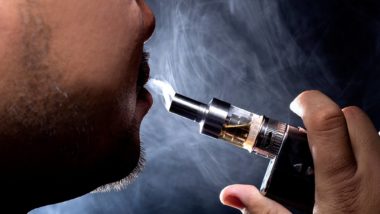Top Class Actions’s website and social media posts use affiliate links. If you make a purchase using such links, we may receive a commission, but it will not result in any additional charges to you. Please review our Affiliate Link Disclosure for more information.

A report published in the Proceedings of the National Academy of Sciences says when heated to a high temperature, vitamin E acetate produces an “exceptionally toxic” gas known as ketene. Studies completed on rats refer to ketene as “respiratory poison” to the rodents.
Ireland chemist and research co-author Donal O’Shea spoke with Inverse.com about ketene gas. He said that in the past, ketene gas exposure has been seen among heavy industrial processes. He said not a lot of research has been done on ketene, but it’s known to be lethal.
He told Inverse that ketene “has very high pulmonary toxicity, and is lethal at high concentrations.”
O’Shea and fellow co-author Dan Wu believe the inhalation of ketene gas could be a key cause of EVALI, the serious and sometimes deadly lung illness that started to become evident last September, main among people who vaped black market THC products.
Vitamin E acetate supposedly became a popular material to create black market vaping liquids because it was cheaper than THC oil.
The suggestion that a toxic gas could be responsible for EVALI was initially floated about by Brandon Larsen, M.D. Ph.D., who wrote a paper about EVALI that was published in the October 2019 issue of The New England Journal of Medicine. Larsen is a pathologist with the Mayo Clinic’s lung cancer program in Phoenix, Ariz.
In an interview with Inverse.com, Larsen said, “The lungs bear a very close resemblance to what we see in workers where an industrial accident has occurred, with a toxic chemical spill or toxic fume exposure, or perhaps a poisonous gas exposure.”
The Centers for Disease Control and Prevention (CDC) said they found vitamin E acetate in samples of fluid taken from the lungs of 48 out of 51 EVALI patients. By the end of February, the CDC had identified 2,807 cases of EVALI and 68 of those resulted in patient deaths.
Since February, the number of newly reported EVALI cases has dwindled to near zero.
E-cigarettes and Lung Health
According to Gaspforair.org, at least 42 different chemicals have been found in e-cigarettes. In addition to nicotine, which is the substance that makes cigarettes and e-cigarettes addictive, other dangerous toxins are inhaled with every puff or vape.
An entire generation has become addicted to e-cigarettes even though numbers of teens who smoke traditional cigarettes have been declining for the last several years.
Among the chemicals and metals linked to e-cigarettes and lung health impairment are:
- Acetaldehyde
- Acetone
- Benzene
- Diethylene Glycol
- Formaldehyde
- Propylene Glycol
- Tin
- Lead
- Cadmium
- Chromium
- Nickel
- Tin
Gaspforair.org is the website of Group to Alleviate Smoking Pollution (GASP) of Colorado.
Like ketene, formaldehyde is a chemical that can be produced when the e-liquid heats up too much or when an inadequate amount of liquid reaches the heating element, resulting in a “dry-puff.” Formaldehyde has been linked to the development of several different types of cancer, including leukemia.
Benzene is found in air that is polluted from burning coal and oil, gasoline and automobile exhaust. Chronic inhalation has been linked to the development of aplastic anemia and leukemia. The U.S. EPA classifies benzene as a known human carcinogen through any type of exposure, inhalation or otherwise.
Propylene glycol is an ingredient in antifreeze and is responsible for the vapor cloud produced during vaping an e-cigarette. The substance also may be used to create fog or smoke effects in theatrical productions. People who are frequently exposed to propylene glycol may experience respiratory, throat and nose irritations and watering eyes. Children may suffer an increased risk of asthma from repeated exposure to the chemical.
Join a Free E-Cigarette Heart & Lung Lawsuit Investigation
If you or a loved one developed heart or lung problems after using e-cigarettes containing nicotine and/or THC, you may qualify to join this e-cigarette lung injury lawsuit investigation.Learn more by filling out the form on this page for a free case evaluation by a JUUL e-cigarette injury lawyer.
ATTORNEY ADVERTISING
Top Class Actions is a Proud Member of the American Bar Association
LEGAL INFORMATION IS NOT LEGAL ADVICE
Top Class Actions Legal Statement
©2008 – 2024 Top Class Actions® LLC
Various Trademarks held by their respective owners
This website is not intended for viewing or usage by European Union citizens.
Get Help – It’s Free
Join a Free E-Cigarette Heart & Lung Injury Lawsuit Investigation
If you qualify, an attorney will contact you to discuss the details of your potential case at no charge to you.
PLEASE NOTE: If you want to participate in this investigation, it is imperative that you reply to the law firm if they call or email you. Failing to do so may result in you not getting signed up as a client or getting you dropped as a client.
E-mail any problems with this form to:
Questions@TopClassActions.com.












